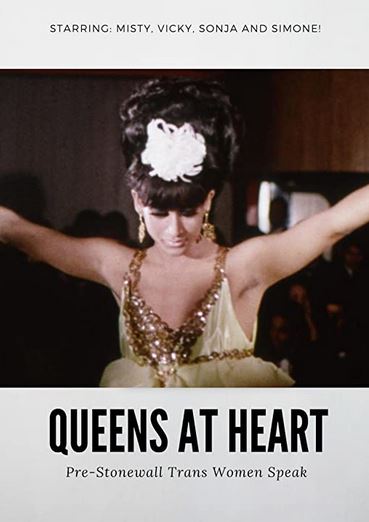Release Year: 1979
Original title: Μπέττυ
Synopsis:
Synopsis:
In the landscape of Greek cinema, few works capture the complexities of identity, struggle, and resilience as poignantly as Μπέττυ (1979), a docudrama directed by Dimitris Stavrakas. This compelling film draws from the life of Elizabeth Vakalidou, a trailblazing figure in Greece’s LGBTQ+ movement. Through its rich narrative and emotional depth, Μπέττυ not only recounts Vakalidou's personal journey but also sheds light on broader societal issues regarding gender identity and sexual orientation in a conservative cultural context.
Born in Alexandroupolis, Elizabeth Vakalidou faced significant challenges from a young age. As a teenager, she experienced rejection and expulsion from her home village, prompting her to move to Athens in search of acceptance and the freedom to live as her true self. This quest for identity became a central theme in her life, and Athens offered both a sanctuary and new struggles.
Vakalidou's story took a dramatic turn when she fled to America, where she lived as an undocumented immigrant for two years. Her experiences in the United States were marked by both hardship and personal growth, as she navigated the complexities of life away from her homeland. This period became foundational in shaping her understanding of gender and identity, ultimately reinforcing her resolve to advocate for herself and others upon her return to Greece.
Returning to Greece, Vakalidou co-founded the Gay Liberation Movement of Greece (AKOE), a landmark organization dedicated to advocating for the rights of LGBTQ+ individuals. Her activism coincided with a pivotal moment in Greek society, where discussions around sexuality and identity were becoming more prominent yet remained fraught with tension. In 1980, she published her first autobiographical book, which became a bestseller despite a ban on its sale. The book not only resonated with many readers but also sparked significant controversy, challenging societal norms and expectations.
The publication was met with both enthusiasm and backlash, illustrating the cultural friction surrounding LGBTQ+ issues in Greece at the time. It was a daring act of self-affirmation and defiance, paving the way for future generations of activists. Vakalidou’s voice emerged as a beacon for those seeking acceptance and understanding in a society often hostile to non-conformity.
Dimitris Stavrakas’s Μπέττυ encapsulates Vakalidou's life story with a blend of documentary realism and dramatic narrative. The film delves into her childhood, her struggles with identity, and her eventual embrace of womanhood in a world that frequently rejected her. Through a combination of interviews, dramatized reenactments, and personal reflections, Stavrakas constructs a rich tapestry that highlights Vakalidou's resilience and determination.
The film's portrayal of Vakalidou's transition to living as a woman is both sensitive and honest. It reflects the emotional turmoil and societal challenges she faced, offering viewers a deeper understanding of the complexities involved in gender identity. By focusing on her journey, Μπέττυ serves not just as a biographical account but also as an exploration of the societal constructs surrounding gender and sexuality in Greece.
Upon its release, Μπέττυ garnered attention for its bold subject matter, contributing to ongoing discussions about LGBTQ+ rights in Greece. The film's candid portrayal of Vakalidou's life opened up conversations that were long overdue in Greek society. It was a film that dared to confront stigmas and push against the boundaries of acceptability.
Critics and audiences alike praised the film for its honest storytelling and the powerful performance that brought Vakalidou’s character to life. The documentary aspect of the film, combined with its dramatic elements, allowed it to resonate on multiple levels, making it a significant contribution to Greek cinema. It not only illuminated Vakalidou's experiences but also reflected the struggles of many within the LGBTQ+ community, amplifying their voices and stories.
Today, Μπέττυ remains a crucial part of the conversation surrounding LGBTQ+ rights in Greece. Vakalidou's legacy as a pioneer of the Gay Liberation Movement continues to inspire activists and advocates striving for equality and acceptance. The film serves as a reminder of the courage it takes to live authentically in the face of adversity.
As society evolves, Μπέττυ stands as a historical document that captures a moment in time when conversations about gender and identity began to emerge from the shadows. It is a testament to the enduring struggle for recognition and rights faced by marginalized communities, highlighting the importance of storytelling in fostering understanding and compassion.
Μπέττυ by Dimitris Stavrakas is more than a film; it is a powerful exploration of identity, resilience, and the human spirit. Through the lens of Elizabeth Vakalidou's life, the docudrama invites viewers to reflect on the complexities of gender and sexuality, challenging societal norms and expectations. As Vakalidou’s story continues to resonate, Μπέττυ remains a vital part of the ongoing dialogue about acceptance, love, and the right to live authentically, underscoring the importance of visibility and representation in the journey toward equality.
via: filmfestival.gr
Image credits: YouTube






















Post a Comment